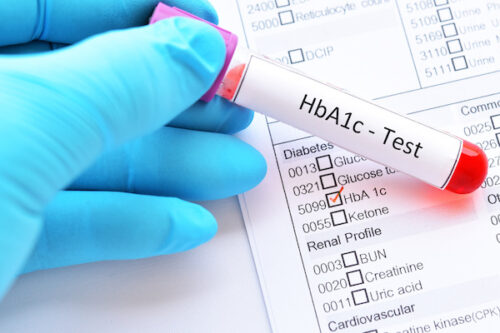Favorite 5 Articles from the December 2008 Newsletter

Favorite 5 Articles from Recent Medical Journals
Undeniable Evidence: Diabetes Treatments Do More Harm Than Good
Glucose Control and Vascular Complications in Veterans with Type 2 Diabetes by William Duckworth in the December 17, 2008 issue of the New England Journal of Medicine found, “Intensive glucose control in patients with poorly controlled type 2 diabetes had no significant effect on the rates of major cardiovascular events, death, or microvascular complications.” This study, called the Veterans Affairs Diabetes Trial (VADT) was of 1791 military veterans (mean age 60.4 years) who had a suboptimal response to therapy for type-2 diabetes. They were assigned to receive either intensive- or standard-glucose control and studied for 5.6 years. The intensive-therapy reduced the Hemoglobin A1c levels to 6.9%; compared to 8.4% in the standard-therapy group. The patients were also put on aspirin and a statin.
A weight gain of 18 pounds occurred with the intensive-treatment compared to 9 pounds with standard-therapy. There were 95 deaths from any cause in the standard-therapy group and 102 in the intensive-therapy group. In the intensive-therapy group, the number of sudden deaths was nearly three times the number as those in the standard-therapy group (11 vs. 4). More patients in the intensive-therapy group had at least one serious adverse event, predominantly hypoglycemia, than in the standard-therapy group.
These pharmaceutical companies—Sanofi-Aventis, GlaxoSmithKline, Novo Nordisk, Roche, Kos Pharmaceuticals, and Amylin—provided medications and financial support for the study.
Comment: This is the third industry-funded study published this year showing aggressive treatment hurts patients. On June 12, 2008 the ACCORD trial and ADVANCE trials were also published in the New England Journal of Medicine. Together, the effect of these three well-designed randomized studies should be enough to halt aggressive prescribing of diabetic pills and insulin to type-2 diabetics. Will this overwhelming evidence change how doctors practice? Probably not. Drug companies have millions of advertising dollars dedicated to emphasizing any slight benefits their drug treatments may show and minimizing the harms. In this manner they convince doctors to prescribe and patients to buy useless and harmful products. Most doctors are too afraid of lawsuits to stand up for the patients and against the drug companies. To change current practice, doctors need to fear being sued for too aggressively treating patients. Even more, they need to fear being sued for failing to prescribe the correct treatment for type-2 diabetics—a change in diet. None of these three studies published in one of the world’s most prestigious medical journals taught dietary and lifestyle modification to their patients.
Currently, Food and Drug Administration (FDA) approval for a diabetic medication requires evidence that the drug will lower blood sugar—not that it improves the patient’s life. The title of my February 2008 newsletter describes the results of such narrowly focused therapy: “Intensive Therapy Means Dying Sooner with Better Looking Numbers.” The FDA is as of December 2008 recommending that all new drugs developed for the treatment of type-2 diabetes show that they do not increase the risk of cardiovascular events. However, this is not a requirement, just a recommendation or suggestion to the pharmaceutical companies.
Eating the rich western diet causes type-2 diabetes. A change in diet will cure essentially all type-2 diabetics—at the same time causing them to lose weight, reverse heart disease, and dramatically improve their overall health.
*ACCORD = Action to Control Cardiovascular Risk in Diabetes
**ADVANCE = Action in Diabetes and Vascular Disease: Preterax and Diamicron Modified Release Controlled Evaluation
1) Duckworth W, Abraira C, Moritz T, Reda D, Emanuele N, Reaven PD, Zieve FJ, Marks J, Davis SN, Hayward R, Warren SR, Goldman S, McCarren M, Vitek ME, Henderson WG, Huang GD; the VADT Investigators. Glucose Control and Vascular Complications in Veterans with Type 2 Diabetes. N Engl J Med. 2008 Dec 17. [Epub ahead of print]
2) Action to Control Cardiovascular Risk in Diabetes Study Group, Gerstein HC, Miller ME, Byington RP, Goff DC Jr, Bigger JT, Buse JB, Cushman WC, Genuth S, Ismail-Beigi F, Grimm RH Jr, Probstfield JL, Simons-Morton DG, Friedewald WT. Effects of intensive glucose lowering in type 2 diabetes. N Engl J Med. 2008 Jun 12;358(24):2545-59.
3) ADVANCE Collaborative Group, Patel A, MacMahon S, Chalmers J, Neal B, Billot L, Woodward M, Marre M, Cooper M, Glasziou P, Grobbee D, Hamet P, Harrap S, Heller S, Liu L, Mancia G, Mogensen CE, Pan C, Poulter N, Rodgers A, Williams B, Bompoint S, de Galan BE, Joshi R, Travert F. Intensive blood glucose control and vascular outcomes in patients with type 2 diabetes. N Engl J Med. 2008 Jun 12;358(24):2560-72.
4) (http://www.medscape.com/viewarticle/585593)
Brain Impairment from the Atkins Diet
Low-carbohydrate weight-loss diets. Effects on cognition and mood by Kristen D’Anci in the February 2009 issue of the journal Appetite concluded that, “The present data show memory impairments during low-carbohydrate diets at a point when available glycogen stores would be at their lowest.” Women followed a low-carbohydrate diet, similar to the Atkins diet, or a reduced-calorie balanced diet, similar to that recommended by the American Dietetic Association (ADA). “Results showed that during complete withdrawal of dietary carbohydrate, low-carbohydrate dieters performed worse on memory-based tasks than ADA dieters. These impairments were ameliorated after reintroduction of carbohydrates.” After about one week of severe carbohydrate deprivation subjects demonstrated impairment of memory.
Comments: Have you noticed any of your dieting friends slipping with their physical or mental health? There are scientific reasons to believe this is a real change caused by a deficiency of “brain fuel,” which is carbohydrate. Sugar (glucose) is the primary, preferred fuel for the brain and it is not stored in the brain tissues. Thus, the brain is dependent upon circulating glucose in the blood stream. This glucose comes almost exclusively from eating carbohydrates. Except for milk and honey, only plant-derived foods contain carbohydrate. The body’s stores of carbohydrate last about 24 to 72 hours after starting on a low-carbohydrate, Atkins-type diet. Upon depletion of carbohydrates the body metabolizes body fat into ketones, which can be used, but less efficiently, by the brain tissues and other body tissues for fuel.
The popularity of low-carbohydrate diets is waning, but I doubt they will vanish because they promise quick weight loss while consuming familiar foods like beef, butter and Brie. These diets work by simulating sickness. Without carbohydrate the body turns to fat for energy. Ketones are produced from fat metabolism and with their accumulation a condition of ketosis develops. Ketosis suppresses the appetite. Weight loss follows as long as ketosis-induced, appetite-suppression, is maintained. Most dieters cannot tolerate the unpleasantness of sickness for long and they give up, regaining all their lost body fat.
The foods consumed for a low-carbohydrate diet (meat, poultry, fish, cheese, eggs) are known to cause many serious illnesses, including heart disease, strokes, cancer, osteoporosis, and constipation. This is not the right way to lose weight.
D’Anci KE, Watts KL, Kanarek RB, Taylor HA. Low-carbohydrate weight-loss diets. Effects on cognition and mood. Appetite. 2009 Feb;52(1):96-103.
Breast Cancers Spontaneously Disappear
The natural history of invasive breast cancers detected by screening mammography by Per-Henrik Zahl published in the November 24, 2008 issue of the Archives of Internal Medicine found, “that the natural course of some screen-detected invasive breast cancers is to spontaneously regress.” The investigators found invasive breast cancer 22% more often in women who had a mammography every other year for 6 years than those who did not (1909 vs. 1564 per 100 000 women). If all cancer were to naturally progress and none disappear then the same number of cancers would be expected to be found in the women who received regular screening every other year and those who only had one exam after 6 years. Their conclusion was, “it appears that some breast cancers detected by repeated mammographic screening would not persist to be detectable by a single mammogram at the end of 6 years.” The final remarks of the investigators were, “Our findings are equally consistent with the possibility that mammography either leads to a reduction in breast cancer mortality or has no effect at all. Instead, our findings simply provide new insight on what is arguably the major harm associated with mammographic screening, namely, the detection and treatment of cancers that would otherwise regress.”
Comment: Spontaneous regression of advanced breast cancer has been reported. One recent reported identified 32 such cases, but there are certainly many more unreported cases. Advanced melanoma, brain cancer (neuroblastoma), and kidney cancer are also known to disappear without treatment. Precancerous changes in the female uterine cervix and colon polyps also regress.
Most of my readers know that I am against doing “early detection” screening tests for most cancers, including those of the breast, prostate, and lung cancer. This study provides one more reason to avoid mammography and even breast-self examination—benefits of which have been seriously questioned. The harms from these detection campaigns are, however, unquestioned.*
I often see women with breast cancer, men with prostate cancer, and both genders with many other forms of cancer in late stages. Their doctors have given them no hope—in fact, in most cases their well-intentioned treatments add to their misery. Hopelessness compounds the suffering. Patients need to be told that even with advanced cancer, sometimes there is recovery, called spontaneous remission. I believe this miracle is more likely to happen for someone in good health, rather than in poor health. The only way I know to consistently improve health is by replacing destructive habits with good ones. The most powerful of these changes is switching from the meat-, dairy-, and junk food-based Western diet to the McDougall starch-based diet. I have seen what I believe to be spontaneous remissions in my patients several times. Ruth Heidrich, reported as a Star McDougaller, is one remarkable example of metastatic breast cancer diagnosed over 26 years ago—and she lives cancer free today.
*I believe there are minor benefits to be had from PAP smears every 3 to 5 years until age 50, one routine colon exam (polyps) at age 55 to 60, exams of the mouth (leukoplakia), and skin exams (pre-melanoma).
1) Zahl PH, Maehlen J, Welch HG. The natural history of invasive breast cancers detected by screening mammography. Arch Intern Med. 2008 Nov 24;168(21):2311-6.
2) Larsen SU, Rose C. Spontaneous remission of breast cancer. A literature review. Ugeskr Laeger. 1999 Jun 28;161(26):4001-4.
3) Baxter N; Canadian Task Force on Preventive Health Care. Preventive health care, 2001 update: should women be routinely taught breast self-examination to screen for breast cancer? CMAJ. 2001 Jun 26;164(13):1837-46.
4) Gøtzsche PC, Nielsen M. Screening for breast cancer with mammography. Cochrane Database Syst Rev. 2006 Oct 18;(4):CD001877.
The Ancient Human Diet Is Starch-based
Starch grains on human teeth reveal early broad crop diet in northern Peru by Dolores Piperno reported in the December 16, 2008 issue of the Proceeding of the National Academy of Science, found plant parts on the teeth (dental plaque) of people who lived in Northern Peru as long as 11,200 years ago and concluded, “Starch grain studies of dental remains document plants and edible parts of them not normally preserved in archaeological records and can assume primary roles as direct indicators of ancient human diets and agriculture.”
Researchers examined 39 human teeth found in northern Peru’s Nanchoc Valley from six to eight individuals. Some of the grains had been cooked. The diet of these people was considered stable for possibly 5000 years (until 6000 years ago). These people cultivated their crops close to their circular houses. Starch granules from Lima beans, common beans, peanuts, nuts, squash, grains, and fruits were identified.
Comment: Often the only findings reflecting the diet of ancient people are the hard bones of animals that are found near their ruins. Any plant material has decayed and disappeared. Because of this many people have come to the wrong conclusion that early people were primarily hunters and their diet was largely of meat. However, this research adds support for my often-stated position, that all large populations of trim, healthy people, throughout written human history, have obtained the bulk of their calories from starch.
The early ancestors of modern humans, from at least 4 million years ago, followed diets almost exclusively of plant-foods. Beginning at least 250,000 years ago, people survived as hunter-gatherers with a subsistence standard of living, eating foods that extended from one extreme to the other in proportions of plant vs. animal foods—from the raw flesh and fat of marine mammals; the Arctic Eskimos—to diets composed largely of wild plants of the Western Desert; the Australian Aborigines. Hunter-gatherers took advantage of any dependable sources of food from their wild local environments. Because of the ease and dependability (compared to obtaining animals), gathering fruits and vegetables was a primary source of food for most hunter-gatherer societies. The emphasis on hunting increased in higher latitudes because of plant scarcity.
1) Piperno DR, Dillehay TD. Starch grains on human teeth reveal early broad crop diet in northern Peru. Proc Natl Acad Sci U S A. 2008 Dec 16;105(50):19622-7.
2) Milton K. Back to basics: why foods of wild primates have relevance for modern human health. Nutrition. 2000 Jul-Aug;16(7-8):480-3.
3) Milton K. Hunter-gatherer diets-a different perspective. Am J Clin Nutr. 2000 Mar;71(3):665-7.
Diet Benefits Prostate Cancer (Another Ornish Contribution)
Clinical events in prostate cancer lifestyle trial: results from two years of follow-up by Joanne Frattaroli published in the December 2008 issue of the journal Urology found, “Patients with early-stage prostate cancer choosing active surveillance might be able to avoid or delay conventional treatment for at least 2 years by making changes in their diet and lifestyle.” By 2 years of follow-up, 13 of 49 (27%) control patients and 2 of 43 (5%) experimental patients—those encouraged to adopt a low-fat, plant-based diet, to exercise and practice stress management, and to attend group support sessions—had undergone conventional prostate cancer treatment (radical prostatectomy, radiotherapy, or androgen deprivation).
Comment: This is the second report of the Prostate Cancer Lifestyle Intervention Trial started by Dean Ornish, MD. Given the honest facts about standard prostate cancer treatments, most patients would elect diet, and delay or avoid surgery, radiation, hormone deprivation (pills or cutting off their testicles), and chemotherapy. These damaging treatments fail to produce consistent survival benefits—and every doctor and patient should know the results of a century of research. Doing nothing would be a better option for most patients. Research also shows that the high-fat, meat- and dairy-rich Western diet causes this disease. Common sense says “Don’t throw gasoline on a fire.”
Frattaroli J, Weidner G, Dnistrian AM, Kemp C, Daubenmier JJ, Marlin RO, Crutchfield L, Yglecias L, Carroll PR, Ornish D. Clinical events in prostate cancer lifestyle trial: results from two years of follow-up. Urology. 2008 Dec;72(6):1319-23. Epub 2008 Jul 7.
Recommended Articles

Finding a Healthcare Provider

The Latest Scams from the Diabetic Industry






